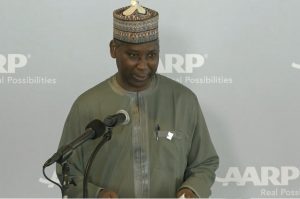– As delivered –
Statement by H.E. Tijjani Muhammad Bande, President of the 74th Session of the United Nations General Assembly
12 February 2020

Excellencies, Ladies and Gentlemen,
I would like to thank the Organizers, AARP and UNDESA for this timely event.
Longevity is becoming a reality all over the globe. Modern scientific breakthroughs have transformed medical practice and afforded men and women opportunities to live longer than previously thought common. Equally significant is the chance that science presents the aged population to stay healthy and live life to the fullest.
The development of course has momentous demographic implications. For the first time in history, the number of people aged 60 years and above exceeds the number of children under five years of age.
This demographic shift affects all regions of the world. I welcome today’s opportunity to learn more about the public sector’s role in creating an environment conducive to age diverse and inclusive workforces.
Last November, I attended the African Regional Conference on the Rights of Older Persons which was organized by the Stakeholder Group on Ageing in Africa. In my address to the Conference, I underscored the importance of factoring the needs and rights of Older Persons into the 2030 Agenda for Sustainable Development as well as the African Union Agenda 2063.
Promoting the dignity of older persons is fundamental to ensuring the respect that this demographic group deserves. It is a group that is estimated to be about one billion by 2030.
Now is the time to take care of them so they can live a dignified life.
Excellencies,
Ladies and Gentlemen,
By 2030, there will be nearly one billion people age 65 and older around the world. I am delighted to report that the United Nations works closely for the introduction and implementation of new and existing policies that would improve the living conditions of older persons all over the world.
Since the adoption of the Universal Declaration of Human Rights in 1948, Member States have, through the General Assembly, taken the lead in further developing the normative agenda by adopting resolutions and declarations on the rights of older persons.
In 2002, the UN committed to “building a society for all ages” by adopting the Madrid Plan of Action, a roadmap for handling the issue of ageing in the 21st-century. Member States are committed to integrating questions of ageing in broader frameworks for social and economic development, and human rights.
The latest resolution adopted by the General Assembly in December 2019, recognizes the need to consider and include issues of relevance to older persons in its implementation.
This is premised on the realisation that older persons are substantive contributors to the development and stability of society.
However, large numbers of older persons worldwide face challenges. They are victims of discrimination, are more liable to be poor and destitute, and to abuses that restrict their human rights and their contribution to the workforce and society.
Inclusion is a key priority for the seventy-fourth Session of the General Assembly and should be a key priority for all in the public sector. We must facilitate societal and structural changes including adaptive labour policies, social protection, universal health coverage, and lifelong learning. There is simply no such thing as ‘school going age’, everyone at every age should be facilitated to learn.
The emphasis has been on amplifying the voices of vulnerable groups including the aged. Ensuring decent and dignified lives for older persons is essential in efforts at reducing inequalities and at achieving the Sustainable Development Goals. This is a responsibility for both the public sector and the private sector.
When ageing is embraced as an achievement, the reliance on the skills, experience, and wisdom of older persons becomes an asset in societies committed to equity and desirous of prosperity.
Excellencies,
Ladies and Gentlemen,
A recent AARP survey indicates that seven out of 10 adults enjoy working with people from other generations. Older workers appreciate the technological know-how and creativity of younger colleagues. And younger colleagues value older workers’ insight, wisdom and experience.
By promoting lifelong learning, improving access to goods and services for older persons, and fighting all forms of discrimination and exclusion based on age, we can transform ageing demographics into productive economic agents rather than remaining burdens or be seen as burdens on the tax paying public.
Excellencies,
Ladies and Gentlemen,
Let us all be reminded: ageing is a natural process. We must come to terms with this reality and accommodate it in our plans. Ageing only becomes a problem when timely action for adaptation is not taken.
When ageing is embraced as an achievement, the reliance on the skills, experience, and wisdom of older persons becomes an asset in societies committed to equity and desirous of prosperity.
To deliver the SDGs in this Decade of Action and Delivery, Member States must work together with all stakeholders, especially the private sector.
I call upon all stakeholders, especially Member States, and the public sector to support, and participate in the global efforts towards an age-inclusive implementation of the 2030 Agenda for Sustainable Development and other frameworks.
I welcome AARP’s collaboration with 100 private sector partners. I encourage similar multi-stakeholder initiatives and mutually beneficial cooperation in the future to address our mutual challenges.
We can only achieve a multi-generational workforce and an inclusive and just society if we work together.
This is one obvious way to leave no one behind, which is our commitment.
I thank you and Bon Apétit!